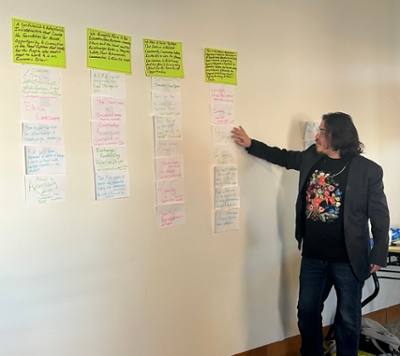Community Engagement Center Awarded Food as Medicine Funding
February 28, 2023 - Dorene DiNaro
 The Community Engagement Center (CEC) has a longstanding history of creating partnerships and opportunities for youth to engage in food justice initiatives through apprenticeships, networks and initiatives, and civic engagement. They recently received funding to help further these efforts.
The Community Engagement Center (CEC) has a longstanding history of creating partnerships and opportunities for youth to engage in food justice initiatives through apprenticeships, networks and initiatives, and civic engagement. They recently received funding to help further these efforts.
CEC was awarded a $227K Food As Medicine grant from the NewSchools Venture Fund (NSVF)—an organization that invests in four key areas: innovate public schools, learning solutions, diverse leaders, and racial equality. Under the learning solutions platform, they plan to develop a comprehensive curriculum including history and practice for use at schools of all grade levels.
The two key outcomes they hope to achieve are creating an online platform that has resources, guides, technical tools, list of services, curriculum, that will help schools adopt a Food as Medicine learning solution; and creating a strategy or coordinated plan for piloting the unique services each of our organizations offers with schools.
“Every culture has a connection to healing foods, but many may not know about that connection or how we got to where we are today,” says CEC director, Dr. Kiran Katira. “We are working with a core group of individuals and organizations to develop a learning solution for anyone and everyone interested in seeing how nutritious traditional food in schools, Indigenized food curriculum, and the history of food justice can help us heal in different ways. The Food as Medicine model goes beyond physical nourishment; it creates opportunities for community/families (who are indigenous/immigrant) to build on their ancestral knowledge of caring and nourishing whole communities in the face of historical oppression.”
Vanessa Apodaca, program coordinator with CEC, and core group member for the initiative adds, “the NSVF funding serves as a catalyst for CEC to partner with a network of schools to use Food as Medicine as the approach to nurturing student development throughout the whole school day and school year. The Food as Medicine model is an“Indigenized” whole school approach that allows children to feel a sense of connectedness and belonging to their academic environment as it draws on funds of knowledge from home cultures.”
“CEC has taken many forms since its inception in the late 1990’s, and throughout that time it has invested in the experiences for young leaders to apprentice with community members who address local food injustices,” she says, “This body of work was inspired by the CEC’s long-standing relationship with community partners who have cared for the health and wellbeing of our communities and done so using anan anti-racist lens.”
Katira says that one of the main goals of the initiative is to look at the history of society and the way in which food has been commodified for economic gain rather than a part of culture. “Mass production of food is tied to the economy,” she says. “Everyone should know how we got to a place where 5- and 10-year-olds are having to deal with Type two diabetes.”
“We’ve seen how the impact of food justice cuts across every part of our community—something that’s beyond just schools,” Apodaca says. “We want to bring the learning solution to anyone and everyone interested in seeing how food justice can help us heal in a different way.”
“The Food As Medicine initiative aligns with the president’s 2040 goals by listening to, and learning with individuals and non-profits across NM to fully understand how we can address one of the most pressing needs in our state: food justice,” Katira says. “ We believe a positive step is a learning solution that schools/communities can readily utilize to help address the gaps in access to nutritional food and the knowledge about ancestral foods to connect us to our rich cultures.”
Katira says that everything CEC engages in is aligned with the UNM 2040 goal of “Inclusive Excellence,” and the Food as Medicine Initiative is an anti-racist act, serving as a re-connection to ancestral foods and knowledge as a way for our BIPOC communities to re-claim the strength they have in their traditional ways.
“The goal of ‘Student Experience and Educational Innovation’ is nurtured through our intergenerational, cross-racial model that allows students at UNM to engage alongside some of our strongest leaders in the community to address a statewide community-identified need” Katira says.
CEC is currently working on a Food As Medicine strategic planning process with some of their long standing partners including Three Sisters Kitchen, FoodCorps, the South Valley Economic Development Center and others to develop long-term strategies and implementation goals that are inspired by the individuals, and entities who hold a stake in a Food as Medicine Learning Solution for schools.
Visit the NSVF website for more information on their funding models, and the Community Engagement Center website for an overview of their initiatives and partnerships.